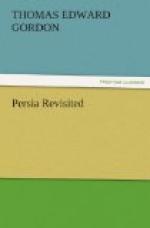The unfortunate episode of the Tobacco Regie in 1891 gave the Moullas a chance to assert themselves, and they promptly seized the opportunity to champion a popular cause of discontent, and the pity of it was that the enterprise which raised the disturbance was English. This tobacco monopoly had been pictured as a business certain to produce great gains, and the people were thus prepared for the reports which were spread of high prices to be charged on what they regard as almost a necessary of life. The conditions of the country were not fully studied before the monopoly powers were put in force. A suggestion was made that the company’s operations should be confined at first to the foreign export, which would have returned a good profit, and that afterwards a beginning should be made at Tehran, to prove to the people that the monopoly would really give them better tobacco, and not raise prices, which the company claimed would be the result of their system. But everything was planned on an extensive scale, and so were prospective profits. The picture of a rapid road to fortune had been exhibited, and it was therefore decided that the full right of monopoly should be established at once. An imprudent beginning was made in exercising the right of search in a manner which alarmed some people for the privacy of their homes, a dangerous suggestion in a Mohammedan community.
The suspicions and fears of all—buyers, sellers, and smokers—were easily worked upon by the priests, ever ready to assert the supremacy of the Church over the State. And then the biggest ‘strike’ I know of took place. Mirza Hassan, the High-Priest of Kerbela, the most sacred shrine of the Shiah Mohammedans, declared tobacco in Persia to be ‘unlawful’ to the true believer, and everyone—man, woman, and child—was forbidden to sell or smoke it. The ‘strike’ took place on a gigantic scale, a million or two certainly being engaged in it, and steps were taken to see the order from Kerbela carried out rigorously. ‘Vigilance men,’ under the Moullas’ directions, made raids on suspected tea-shops, to find and smash the ‘kalian’ pipes which form part of the stock-in-trade of these places of refreshment. The Shah was faced with the sight of silent and forsaken tea-shops as he passed through the streets of Tehran, and he saw the signs of the censuring strike in the rows of empty benches, on which his subjects used to sit at their simple enjoyment of pipes and tea. The interdiction reached the inner homes of all, and even in the anderuns and boudoirs of the highest (all of which are smoking-rooms) it was rigidly obeyed. The priestly prohibition penetrated to the palaces, and royalty found authority set at defiance in this matter. A princely personage, a non-smoker, is said to have long urged and entreated a harem favourite, too deeply devoted to tobacco, to moderate her indulgence in it, but to no effect. On the strike being ordered, she at once joined it, and his Highness is reported to have said, ’My entreaties were in vain, my bribes of jewels were refused, yet the priest prevails.’ And this was at a place where not long before Moullas had been at a discount.




